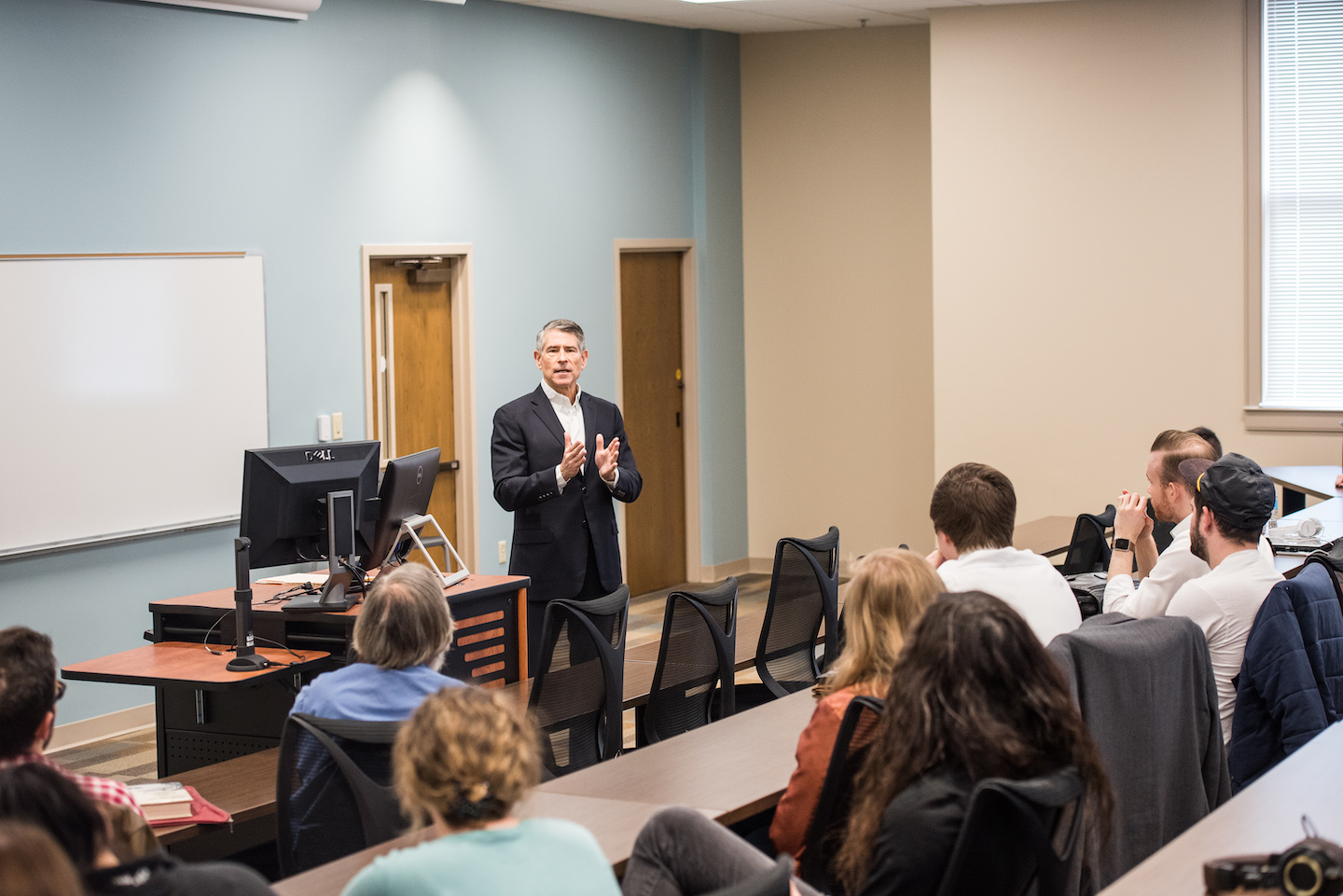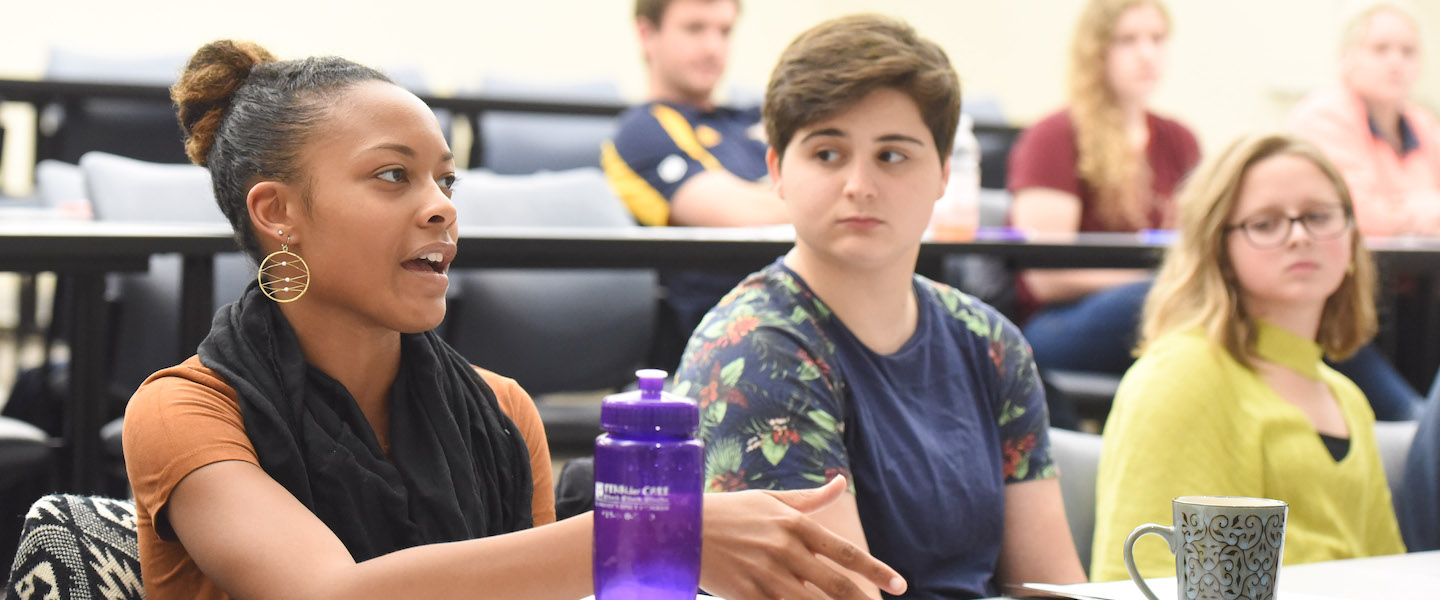Why Major in Politics and Public Law?
 Belmont's Politics and Public Law major offers interdisciplinary classes in politics, business and philosophy. The ultimate goal of this program is to provide a rigorous and challenging curriculum that cultivates the skill sets necessary for legal education.
Belmont's Politics and Public Law major offers interdisciplinary classes in politics, business and philosophy. The ultimate goal of this program is to provide a rigorous and challenging curriculum that cultivates the skill sets necessary for legal education.
In this program, you'll learn both qualitative and quantitative reasoning, enjoy small class sizes and work with highly-qualified professors who are focused on robust student interaction and individual mentorship through the law school admissions process.
You'll also have the opportunity to pursue research and to intern in major political organizations at the state, national and global levels.
In recent years, our majors have landed at such prestigious law schools as the University of Chicago, the University of Virginia, Cornell University and Vanderbilt University. Where will you land?
What You'll Learn
- Qualitative and quantitative reasoning
- Gain a deeper understanding of national politics
- Critical thinking skills
- Research methodology
- Understand the complex relationship between political theory, social change and constitutional law
Career Possibilities
- Policy Analyst
- Attorney
- Historian
- Political Affairs Officer
- Diplomat
- Campaign Manager
- Government and public service
- Business and private corporations
Program Details
Curriculum
The politics and public law major leads to either a bachelor of arts or a bachelor of science. It requires 128 hours of coursework:
- BELL core requirements: 53 hours
- Major requirements (including 18 hours of electives): 49 hours
- Minor requirements: Waived
- General electives: 26 hours
Courses You'll Take
- PSC 1210 American Government
-
An introductory course covering the federal government in the United States.
-
- PHI 1520 Ethics
This course offers a philosophical description of moral practice and an analysis of the theoretical questions which arise from the study.
- PSC 2200 American Political Institutions
The focus of this course is on Congress and the Presidency, the political branches of American government and the bureaucracy. As an introduction to the sub-field of American politics, the course will study these institutions in greater depth through looking at the approaches the discipline takes toward them. In studying these three institutions in greater detail, it will also investigate how they interact to create public policy.
- PSC 2300 International Relations
A survey of the sub-field of international relations, this course gives special emphasis to political and economic factors which contribute to conflict and cooperation among nations.
- PSC 2400 Comparative Politics
This course examines political, economic and social divergence between nations. As one field of political science, comparative politics attempts to identify patterns of divergence and to determine their causes. A particular focus of this course is how differences in institutional arrangements across countries affect differences in outcomes.
- PSC 2500 Political Theory
An introduction to the foundations of normative political theory, with emphasis on great political ideas and thinkers.
- PSC 2600 Social Scientific Methods
This course is designed to provide students with a broad understanding of the various sub-fields, approaches and methods of Political Science. Special emphasis is placed on honing the research, writing and critical thinking skills necessary to succeed in the discipline.
- PSC 4600 Research Seminar in Political Science
A culminating research seminar designed for majors in their last year of matriculation. Students will examine the many sub-fields in the discipline and complete and present a major independent research thesis.
- PSC 3010 Internship
Practical training and experience in government and/or private agencies that provide an environment for substantial growth in the understanding of political science / political economy.
- PSC 3280 American Constitutional Law I
This course is an introduction to legal reasoning and the development of rules through Supreme Court precedent. It focuses on Supreme Court interpretation of constitutional provisions which establish the relationship between government institutions and thus indirectly protect individual rights.
- PSC 3290 American Constitutional Law II
This course is an introduction to legal reasoning and the development of rules through Supreme Court precedent. It focuses on Supreme Court interpretation of constitutional provisions which directly protect individual rights, with some discussion of indirect protection through institutions.
- PSC 4320 International Law
A survey of public international law, this course focuses the nature of international law, its origin and capabilities and the actors involved. It then pursues these larger issues through specific topics in international law, such as laws of war, sea or environment.
- PSC 3210 State and Local Politics
Government in the United States is a complex interaction between federal, state and local levels. This course focuses on the state and local levels, their ability to set policy or influence federal policy as well as the opportunities and means for citizens to influence the policymaking process through them.
- PSC 3250 Southern Politics
This course examines the particular character of politics in the southern United States since the landmark Brown v. Board of Education case. This includes such themes as civil rights, leadership, revolution, power, institutions and elections as well as the evolution of these themes over time.
- PSC 3450 Politics of Europe
This course focuses on the process of regional integration in Europe. It covers theoretical explanations of integration as well as the institutions of the European Union and the policies they produce.
- PSC 3510 Foundations of Democracy
This course examines one of the prerequisites for democracy, a civil society and institutions which support it. It focuses first on the theories which describe the role of civil society and its underpinnings, then on the application of these theories to current society.
- PSC 3610 Game Theory and Public Choice
This course presents an introduction to formal methodology of game theory and rational choice, including their use to analyze policy in the public choice approach. These methodologies are deductive, developing and applying abstract models to understand human action.
- SOC 2450 Law and Society
This course is designed to utilize sociological concepts and methods to examine the relationship between the legal system and other institutions in society. We will consider the importance of law in shaping our social existence and explore the way laws are structured by people, ideas and social conditions. During the semester, you will be given the opportunity to: (1) examine historical influences on the role of law in society; (2) isolate contexts and social forces which shape the creation of laws; (3) analyze compatible and competing theoretical explanations used to justify laws; and (4) perfect and demonstrate meaningful exchange of ideas through both written and verbal communication skills.
- SOC 3700 Criminal Justice
The study of the institutions that process suspected and convicted criminal offenders, this course focuses on legal codes, courts, police, prisons and mass-media crime scares. It offers study of the ways in which these institutions shape and are shaped by large-scale inequality.
- SOC 3800 Criminology
The study of motives for and situations conducive to crime, this course reviews major theories of crime and methods for its study. Focus on specific crimes may vary by semester, but the role of inequality in the shaping of crime remains central.
- MGT 2410 Business Law I
A course in the fundamentals of law in relation to business. Areas studied include: law and its sources, the judicial system, methods of resolving disputes, constitutional law, torts, criminal law, property, and contracts.
- MGT 4220 Business Law II
A second course in law fundamentals related to business transactions. Topics include: the Uniform Commercial Code, bankruptcy, agency, property and forms of business organization.
- MGT 4310 Negotiation
This is a course in basic negotiation skills for business. Areas addressed include interests, options, alternatives, legitimacy, communication, relationships and commitment. There is a combination of theoretical knowledge and practical skills around conflict management and resolution in the workplace.
- ACC 3350 Federal Income Taxes
A study of federal income tax laws with particular emphasis on the preparation and filing of individual, partnership and corporate tax returns.
- MBU 2520 Copyright Law
This course provides an in-depth study of copyright law in the entertainment industry including its origins, rationale, protections and limitations.
- MBU 3550 Music Industry Contract Law
This course examines the background and principles of contract law as applied to the negotiation, creation, interpretation and enforcement of binding agreements in the music industry.
- MDS 4100 Communication Law
Examines governmental regulations affecting news media, advertising, radio broadcasting and telecasting, and the direct effects of such regulations upon management and daily operations.
- PUB 2500 Copyright and Publishing Law
This course covers the foundations of copyright law and intellectual property. Specifically it will focus on covers rights (copyright, trademark and right of publicity) that are important for publishers to understand in their business life; and outlines the exemptions and exceptions that publishers can rely on to avoid having to obtain these rights, with special emphasis on fair use. Additionally it will cover issues with regard to print verses digital, US verses international, and works that are public domain.
- LGS 4010 Legal Writing
This course trains students in techniques of advanced audience analysis for the writing of a variety of legal documents, and in composing advanced analytical and persuasive legal texts. At the completion of the course, students will have written and been evaluated in writing open and closed memoranda and an extended research-based prose persuasive document representative of professional legal writing for publication or for use as a legal brief.
- Student Government Association: SGA positively impacts Belmont University, to the best of their ability, by collaborating between students and administration, supporting student organizations, fostering character and abiding by the Christian standards set forth by Belmont University. Through this, SGA will enable students to have an impact on Belmont and the surrounding community that will outlast themselves.
- Tennessee Intercollegiate State Legislature (TISL): This is an annual legislative session conducted by college students from across Tennessee that provides students with an opportunity to learn about the Tennessee state government and to express their opinions on state issues. This model legislature convenes in the State Capitol for four days and consists of a Senate and a House of Representatives, which debate bills that are produced wholly by the students.
- College Democrats: Belmont College Democrats is a student organization centered around diversity celebrating, community building, robust discussion, civic activism and the exploration of political ideology.
- College Republicans: Belmont College Republicans encourages whomever considers themselves to have conservative values or beliefs (or none at all) to come out and see what they are all about. Their focus is to spread the true meaning of what it is to be a Republican, and they hope to straighten out some misconceptions. We hope to form a community of students who enjoy discussing their political opinions, creating a healthy amount of political awareness on campus.
- United Nations Association at Belmont University: The United Nations Association is a nationwide organization with a mission to educate, advocate and inspire on behalf of the United Nations. What makes our chapter unique is our concerted effort to serve locally and inspire globally in accordance with the 17 sustainable development goals released in 2016. Our chapter will host knowledgeable global leaders to educate us on global issues. We will also host monthly meetings and volunteer opportunities based on the sustainable development goals we are passionate about as an organization. Please join us and learn how to serve as a global leader and local leader!
- Belmont Pre-Law Society: This organization is dedicated to educating students on trial advocacy and social justice, all the while giving them the knowledge and skills they need to be successful in law school. We aim to promote general interest in legal processes and professions by hosting engaging speakers from different areas of the legal field and organizing a diverse series of information sessions, LSAT preparation workshops, volunteer opportunities, networking programs and social events. Additionally, we are affiliated with the American Mock Trial Association and sponsor two competitive mock trial teams that compete numerous times each year.
- UNICEF Belmont: UNICEF’s mission is to promote the rights and well-being of every child. This organization carries out various activities to meet the needs of children in developing countries. This organization is designed to educate, fundraise and raise awareness and will fundraise for UNICEF each semester.
- Belmont Ascend: The organization's main goal is to create a diverse community, foster a global mindset among all Belmont students, develop cross-cultural fluency and prepare Belmont graduates to lead on a global scale. In collaboration with Center for Global Citizenship, Ascend student organization will sponsor monthly series, including global summit, global executive spotlight, town halls, global experiences, volunteering in the community and opportunities to engage with students from other countries.
Alumni Testimonial

Keidron Turner
“The Political Science courses at Belmont stand apart from the average classroom setting by allowing students to socratically discuss challenging political concepts with fellow classmates on a regular basis. To add to this, each professor's immense connection to the political/legal community provides countless opportunities for students to partake in, from working within the state capitol to traveling to Washington, D.C.!”
Request Information
Contact Us
College of Liberal Arts & Social Sciences
Danielle Walden
Admissions Coordinator
615.460.8340

